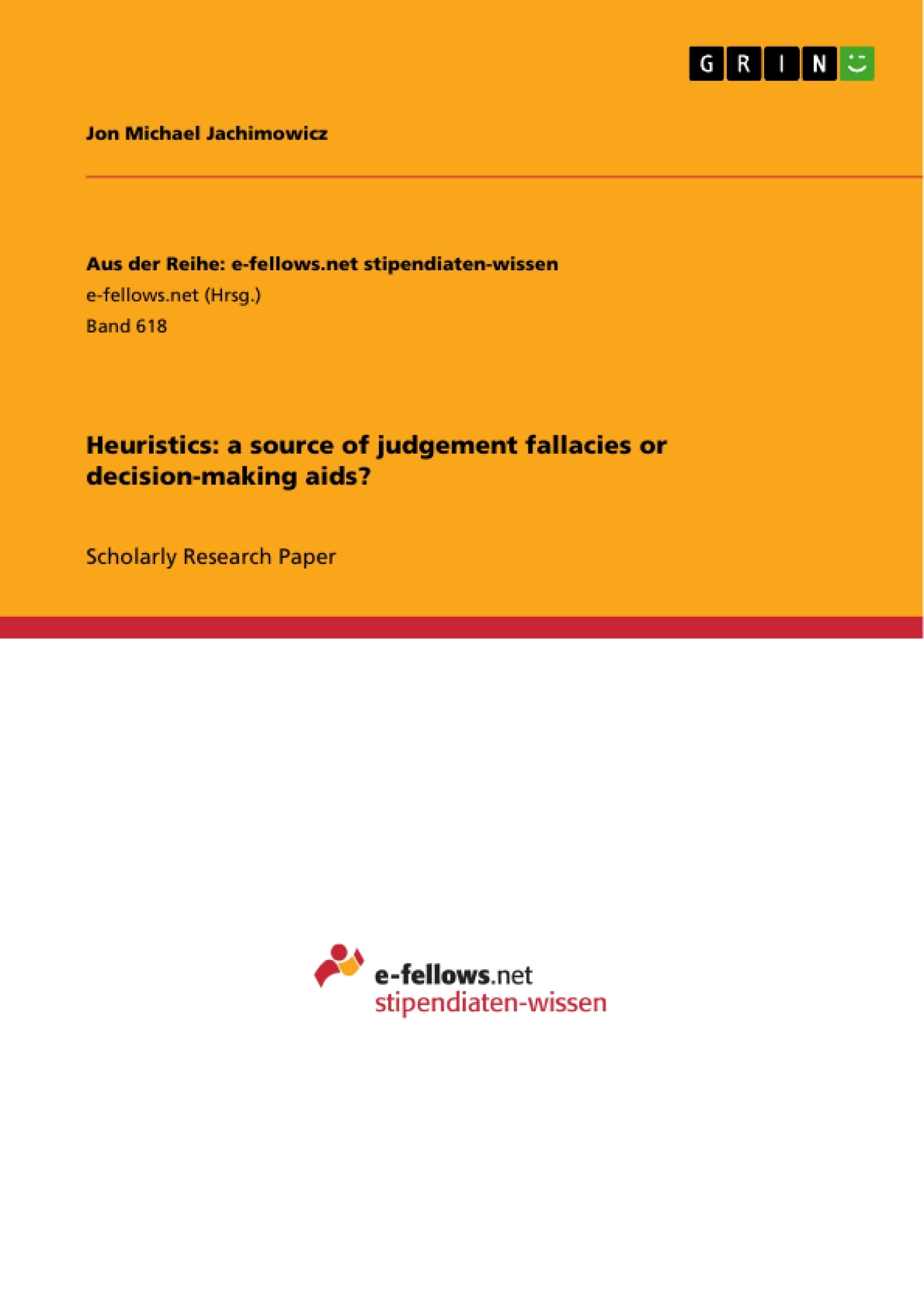This review essay explores different perspectives and conceptualizations
of the study of heuristics, decision-making rules which operate under constrained
time and computation (Kahneman, 2011). Two opposed models of heuristics that
assume conditions of bounded rationality, the heuristics-and-biases and the fastand-
frugal framework, are assessed. Whereas the former evaluates heuristics in
terms of logical rationality and postulates that humans exhibit predictable
fallacies in judgement, the latter focuses on ecological validity, and suggests that
humans possess an adaptive toolbox of evolutionary developed decision-making
rules which enable better decision making. Finally, alternative explanations and
limitations of existing research programs will be explored, concluding with a
demand for a rigorous evaluation of experimental designs as well as outlining
conditions for a possible synthesis.
Table of Contents
- ABSTRACT
- 1. INTRODUCTION
- 2. APPROACHES TO RATIONALITY
- 3. THE HEURISTICS-AND-BIASES FRAMEWORK
- 3.1. THE TWO-SYSTEMS VIEW
- 3.2. ACCESSIBILITY AND THE AVAILABILITY HEURISTIC
- 3.3. NEW HEURISTICS
- 3.3.1. A generic heuristic process
- 3.3.2. Extension of heuristics.......
- 3.3.3 How can System 2 override intuitive judgement (System 1)?
- 3.4. CRITIQUES TO HAB
- 4. FAST-AND-FRUGAL HEURISTICS
- 4.1. SIMILARITIES TO HAB..
- 4.2. DIFFERENCES TO HAB
- 4.2.1. Ecological Rationality.
- 4.2.2. Less-is-more....
- 4.2.3. Bias-Variance Dilemma
- 4.2.4. A predictable model vs. labels..
- 4.2.5. Adaptive Toolbox: Examples of fast-and-frugal heuristics.
- 4.3. CRITIQUES
- 4.3.1. HAB's reply...
- 4.3.3. Evans and Over (2010)...
- 4.3.2. Questioning the predictive power of FAF.
- 5. CONCLUSION.............
- 5.1. ALTERNATIVE EXPLANATIONS AND LIMITS OF EXISTING RESEARCH.
- 5.2. FUTURE DIRECTIONS: A POSSIBLE SYNTHESIS?
- 6. REFERENCES..
Objectives and Key Themes
This review essay explores the different perspectives and conceptualizations of heuristics, decision-making rules that are used in situations with limited time and computational resources. The essay examines two opposing models of heuristics under the framework of bounded rationality, the heuristics-and-biases (HAB) and the fast-and-frugal (FAF) frameworks. The essay highlights the similarities and differences between these two models and provides a critical assessment of each.- The essay explores the origins and definitions of heuristics based on the HAB and FAF frameworks.
- It examines the epistemological and philosophical assumptions underlying these approaches.
- It compares and contrasts the main arguments of each research group.
- The essay critically analyzes the strengths and weaknesses of both frameworks.
- The essay explores alternative explanations and limitations of existing research programs and proposes potential directions for future research.
Chapter Summaries
- Chapter 1: Introduction: This chapter introduces the concept of heuristics and outlines the historical context of research on bounded rationality. It emphasizes the importance of considering the limits of human cognitive abilities and the role of heuristics in decision-making.
- Chapter 2: Approaches to Rationality: This chapter presents different models of rationality, including unbounded rationality and bounded rationality. It highlights the key assumptions and limitations of each model, setting the stage for discussing the role of heuristics in decision-making.
- Chapter 3: The heuristics-and-biases Framework: This chapter delves into the heuristics-and-biases (HAB) framework, focusing on the two-systems view of cognition and the role of System 1 and System 2 in decision-making. It explores specific heuristics, such as the availability heuristic, and examines how these heuristics can lead to biases in judgement.
- Chapter 4: Fast-and-Frugal Heuristics: This chapter introduces the fast-and-frugal (FAF) framework, which emphasizes the ecological validity of heuristics. It contrasts the FAF approach with the HAB framework, highlighting the differences in their assumptions and perspectives on rationality.
Keywords
This review essay focuses on the study of heuristics, a key topic within the broader field of cognitive psychology and decision-making. Key terms include: heuristics, bounded rationality, decision-making, cognitive biases, heuristics-and-biases framework (HAB), fast-and-frugal heuristics (FAF), two-systems view, ecological rationality, and adaptive toolbox.- Quote paper
- Jon Michael Jachimowicz (Author), 2012, Heuristics: a source of judgement fallacies or decision-making aids?, Munich, GRIN Verlag, https://www.grin.com/document/203666




